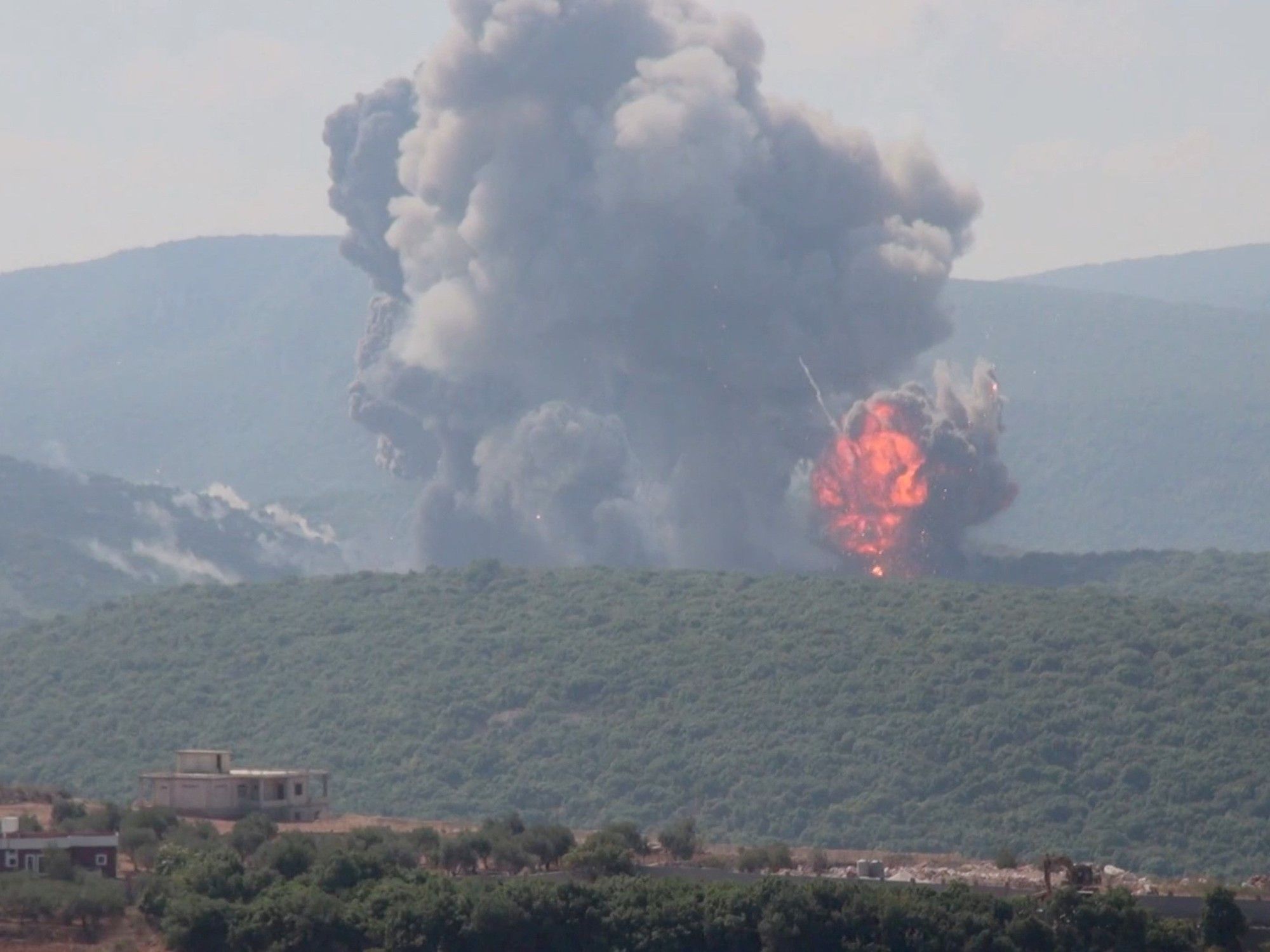INTERNACIONAL
Acusan a Netanyahu de desproteger el norte de Israel de los ataques de Hezbollah: «No nos interesan más»

Tres altos dirigentes de consejos regionales del norte de Israel cortaron comunicación con el Gobierno central, tras ataque al Líbano. Lo acusan de solo intervenir para proteger el centro del país, mientras las comunidades fronterizas sufren desde hace meses un intercambio de fuego diario con el grupo terrorista, Hezbollah.
«No hemos interesado al Gobierno en 10 meses y medio. Desde ahora, no nos interesan más a nosotros. No llamen, no vengan, no envíen más mensajes. Nos hemos apañado solos hasta ahora, nos seguiremos apañando, solos», dice el comunicado conjunto enviado a Benjamín Netanyahu. La misiva está firmada por el líder del consejo regional de Mateh Asher, Moshe Davidovich; el alcalde de Metula, David Azoulay; y el líder del consejo de la Alta Galilea, Giora Zaltz.
Los líderes regionales aseguraron que la operación desplegada por Israel hacia el Líbano de esta madrugada, en la que se atacó con más de 100 aviones de combate a 40 posiciones de Hezbollah y los miles de lanzamientos que apuntaban hacia el centro y norte del país, es «el colmo de la desconexión del Gobierno israelí con cientos de miles de ciudadanos del Norte«.
Desde octubre del año pasado, unas 61.000 personas continúan evacuadas de la frontera norte y distribuidas en hoteles y otros alojamientos en el resto del país. Muchos llevan meses reclamando al Gobierno israelí actuar con dureza en el sur del Líbano y recuperar la normalidad.
En un comunicado, Netanyahu aseguró poco después del ataque que «no es el final de la historia» sino tan solo «otro paso para cambiar la situación en el norte».
Por su parte, el que fuera miembro del gabinete de guerra, Benny Gantz, dijo este domingo que el ataque contra el Líbano es «demasiado pequeño» y llega «demasiado tarde», según declaraciones durante una visita al norte.
«Está prohibido seguir abandonando el norte. Pido a los miembros del Gobierno que despierten«, dijo Gantz. Las autoridades israelíes creen que el grupo libanés tenía como objetivo bases de inteligencia y la sede del Mosad, el servicio de seguridad exterior, en el centro de Israel. Pero todos los drones fueron interceptados y algún cohete cayó en espacios abiertos.
Según los reportes oficiales, el fuego cruzado en la frontera norte de Israel ya se cobró la vida de al menos 643 personas. La mayoría en el Líbano y en las filas de Hezbollah, que confirmó 394 bajas, algunas en Siria.
Además, también murieron al menos 74 integrantes de otras milicias, dos soldados libaneses y más de 124 civiles, incluidos 19 menores y tres periodistas. Por el lado israelí murieron 49 personas -23 militares y 26 civiles, incluidos 12 menores y adolescentes en el ataque a los campos deportivo en los Altos del Golán.
La denuncia de Ehud Olmert contra Netanyahu: «Busca una guerra total»
Ehud Olmert, ex primer ministro israelí acusó este domingo al actual mandatario, Benjamín Netanyahu, de «torpedear» las negociaciones de alto el fuego en la Franja de Gaza, lo que dijo aboca al país hacia una guerra integral en la región.
«Netanyahu no quiere que vuelvan los rehenes. Busca una guerra total«, dijo Olmert en referencia a los 105 que llevan más de 10 meses en manos de Hamás, -al menos un tercio ya muertos-.
Olmert, voz muy crítica contra la gestión del actual mandatario, comandó el país entre 2006 y 2009, años antes de ingresar en prisión por corrupción debido a acciones anteriores durante su tiempo como alcalde de Jerusalén (1993-2003).
La reacción acusatoria llegó tras el estallido de violencia de esta madrugada proporcionada por Israel en la divisoria con el Líbano. «Cuanto más tarde se tarde en llegar al acuerdo, más posible es el estallido del conflicto a nivel regional que incluiría también fuerzas como los rebeldes hutíes de Yemen o las milicias iraníes en Siria e Irak», sostuvo Olmert.
INTERNACIONAL
Militants launch deadly attack on training camp in Mali’s capital

Islamic militants attacked a military training camp and other locations in Mali’s capital Tuesday, sparking deadly gunbattles and the temporary closure of a nearby airport before troops were able to subdue the assailants, officials said. No details of casualties were immediately released.
The militants tried to infiltrate the Faladie gendarme school in Bamako in a rare attack for the capital, prompting a sweep by government troops who later were able to «neutralize» the attackers, army Chief of Staff Oumar Diarra said on national TV, without elaborating.
MILITARY-LED MALI SUSPENDS ALL POLITICAL ACTIVITY UNTIL FURTHER NOTICE
The attack caused «loss of life and material damage,» a security official told The Associated Press, but didn’t provide numbers or details. At least 15 suspects were arrested, said the official, who was inside the training camp at the time of the attack. He spoke on condition of anonymity because he wasn’t authorized to talk to reporters.
Later, the military said that the militants also had attacked other locations, but did not provide details.
The al-Qaida-linked militant group JNIM claimed responsibility for the attacks on its website Azallaq. Videos posted by JNIM on the site show fighters setting a plane at the airport on fire. The group claimed to have inflicted «major human and material losses.»
This video grab shows Malian security personnel detaining a man after Mali’s army said a military training camp in the capital Bamako has been attacked early Tuesday, Sept. 17 2024. (AP Photo)
An AP reporter heard two explosions in the area earlier Tuesday and saw smoke rise from a location on the outskirts of the city where the camp and airport are located.
Soon after the attacks, Mali’s authorities closed the airport, with Transport Ministry spokesman Mohamed Ould Mamouni saying flights were suspended because of the exchange of gunfire nearby. The airport reopened later in the day.
The U.S. Embassy in Bamako told its staff to remain at home and stay off the roads.
Mali, along with its neighbors Burkina Faso and Niger, has for more than a decade battled an insurgency fought by armed groups, including some allied with al-Qaida and the Islamic State group. Following military coups in all three nations in recent years, the ruling juntas have expelled French forces and turned to Russian mercenary units for security assistance instead.
Since taking power, Col. Assimi Goita has struggled to stave off growing attacks by the jihadis. Attacks in central and northern Mali are increasing. In July, approximately 50 Russian mercenaries in a convoy were killed in an al-Qaida ambush.
The mercenaries had been fighting mostly Tuareg rebels alongside Mali’s army when their convoy was forced to retreat into jihadi territory and ambushed south of the commune of Tinzaouaten.
Attacks in the capital of Bamako are rare, however.
«I think JNIM wanted to show they can also stage attacks in the south and in the capital, following the battle on the north near the Algeria border where Wagner suffered losses,» said Ulf Laessing, head of the Sahel program at the Konrad Adenauer Foundation, which promotes democracy.
In 2022, gunmen struck a Malian army checkpoint about 60 kilometers (40 miles) outside the city, killing at least six people and wounding several others. In 2015, another al-Qaida linked extremist group killed at least 20 people, including one American, during an attack on a hotel in Bamako.
CLICK HERE TO GET THE FOX NEWS APP
Tuesday’s attack is significant because it showed that JNIM has the ability to stage a large-scale attack, Wassim Nasr, a journalist and senior research fellow at the Soufan Center, told the AP.
It also shows that they are concentrating their efforts on military targets, rather than random attacks on civilian targets, he said.
-
CHIMENTOS3 días ago
El gobierno interfiere con la agenda cultural de Susana Giménez
-
POLITICA2 días ago
Las chicanas de Javier Milei a Germán Martínez cuando le pidió que no leyera: “Los invito a despejar la x”
-
POLITICA2 días ago
Se calienta la interna en la UCR: Luis Petri salió a defender a los legisladores que apoyan a Javier Milei y le pegó duro a Martín Lousteau
-
POLITICA2 días ago
A horas de su discurso en el Congreso, una nueva encuesta muestra números muy positivos para Milei
-
POLITICA1 día ago
A fin de mes se definiría la condena a Cristina Kirchner por la causa Vialidad
-
POLITICA2 días ago
Para los argentinos, los empresarios y la casta los más beneficiados por las medidas de Milei





























